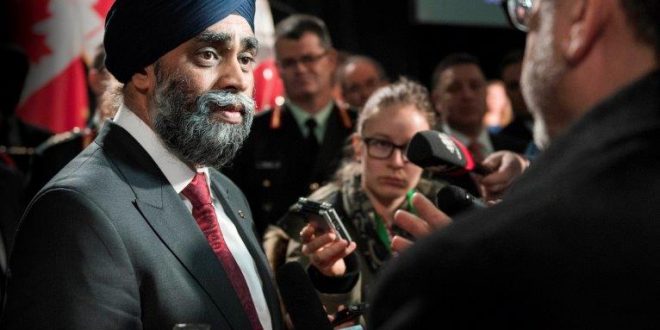How has been your journey as the Defence Minister of Canada so far? What do you think is your biggest contribution, to date, as the defence minister and why?
The best way to describe my journey so far is that it has been humbling. From being born in a small village in India and coming to Canada when I was five years old, to growing up in British Columbia and being privileged enough to become both the Member of Parliament for Vancouver South, and the Defence Minister of Canada, I am extremely fortunate.When I think about where I started, who would have thought that I would one day be part of something like this?
As someone who immigrated to Canada, I have always had a desire to give back to my country. So for me, becoming an MP and Minister, feels like the ultimate way of saying thank you to Canada. It’s also an incredible honour to be responsible for making decisions that affect our Canadian Armed Forces. Having served myself, I do not take this responsibility lightly. Every time I make a decision I ask myself: “What is the impact that this will have on our women and men in uniform? Will this benefit them?”
One thing I’m particularly proud of as Minister of National Defence is our new defence policy Strong, Secure, Engaged. When we formed government in 2015, we knew we needed to take a serious look at the defence vision for our country, after years of neglect under the Harper Conservatives. Our party was clear during the campaign that looking after our women and men in uniform, and the families that support them, is our number one priority. So when I became Minister of National Defence, it became my priority to develop a new vision and approach that focuses on our people. And I’m proud to say we did exactly that.
2 – Could you please elaborate on vision behind Canada’s new Defence Policy — strong, secure and engaged? What is your most favourite feature of the policy?
I would have to say that my favourite thing about our new defence policy, Strong, Secure, Engaged, is that it puts the brave women and men who serve our country, and the families that serve alongside them, at the heart of the policy. In fact, Strong, Secure, Engagedfollowed the most extensive public consultation in Canadian defence history. We reached out to Canadian Armed Forces members and Canadians, and we listened.
Strong, Secure, Engaged, is the result of what we heard, and it offers a clear direction on Canadian defence priorities over the next 20 years, backed up with the resources needed for full implementation.We are investing in our women and men in uniform, and over the next 10 years, we will increase defence spending by over 70 percent. We have already started implementing our policy, and I’m looking forward to continuing to deliver on it.
3 – What is your take on current ongoing Canada and US rocking relations due to NAFTA talks? Do you think it will also affect Canada’s role in NATO and how?
The United States is our closest friend and ally. Our two countries have a long history of serving together, and we are always there for one another. We may disagree at times, but we are steadfast allies, and that will never change.
When it comes to NATO, Canada has always pulled its weight. At the NATO Summit in Brussels last July, our Prime Minister announced that Canada will continue to lead a multinational battlegroup in Latvia, extending our commitment to 2023. Canada has also assumed command of a new NATO training and capacity building mission in Iraq for its first year, to help Iraq transition into a country of long-lasting peace and security.
We are also proud to have rejoined the NATO Airborne Warning and Control System (AWACS) program, after the previous Conservative government withdrew.These are just a few examples of how Canada is stepping up in the Alliance and contributing to peace and security around the world.
4- What is the update on Canadian Peacekeeping mission to Mali and presence in Iraq?
Our government is committed to contributing to international peace and stabilization missions that lead to change. Last March, we announced that Canada would contribute an Aviation Task Force to the UN mission in Mali, MINUSMA.Our contribution includes Chinook and Griffon helicopters as well as troops for a one year period. The Aviation Task Force to Mali is now fully operational and providing medical evacuation and tactical airlifts for UN forces.
When it comes to Iraq, our government remains a committed partner in the multinational coalition against Daesh. Through Operation IMPACT, our mission continues, including the Role 2 medical facility, tactical airlift and air-to-air refueling, and our efforts to support the Coalition in the areas of intelligence operations. As I mentioned before, we are also commanding a new NATO training and capacity mission in Iraq, known as NMI. We are proud to take a leadership role in Iraq, to help this region transition to long-lasting peace and stability.
5-The world has become more susceptible to terrorist attacks and of advanced levels. Are there any threats to Canada’s security? Where do we stand in terms of our preparation against any terror attack? What is your message as the defence minister to Canadians?
Nothing is more important to our government than keeping Canadians safe. Above all else, our Canadian Armed Forces ensures the defence and security of our country. Our new defence policy puts significant emphasis on detecting, deterring and defending threats to or attacks on Canada. We continue to work within NORAD to conduct continental operations to defend against shared continental threats.I can assure Canadians that our government, and our Canadian Armed Forces, will always defend and protect Canada.
 Desi Today Magazine
Desi Today Magazine




